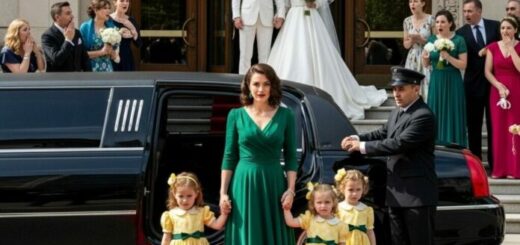Yellowstone | Beth Dutton Unleashes a Storm, John Dutton Plays the Long Game in High-Stakes Showdown
Paradise Valley, Montana – In the rugged, breathtaking landscape of “Yellowstone,” where the Dutton family’s fight for their land is a constant, an episode recently delivered a dual-barreled assault on those who threaten their way of life. From the cutting wit of Beth Dutton turning a casual bar encounter into a public humiliation to John Dutton’s calculated dismantling of a multi-million-dollar development, the series continues to prove why it remains one of television’s most captivating and intense dramas. This particular installment was a masterclass in character, strategy, and the unflinching defense of a legacy.
The tension simmered from the moment Beth Dutton (Kelly Reilly) stepped into the local bar, her signature blend of allure and venom radiating. A seemingly innocuous encounter quickly escalated when a well-dressed man, identified only by his “wandering eye” and an ill-advised attempt at flirtation, approached her. What he perceived as an opportunity, Beth instantly recognized as a trespass. The exchange began innocently enough, with the man’s polite inquiries about Montana life and Beth’s curt, almost challenging responses. His smooth, self-assured demeanor quickly grated against Beth’s raw, untamed spirit. He presented himself as a sophisticated outsider, a “professor somewhere fancy,” and Beth, with a predatory gleam in her eye, zeroed in on his perceived vulnerabilities with surgical precision.
What followed was a verbal evisceration, a performance that only Beth Dutton could deliver with such devastating impact. She didn’t just reject his advances; she deconstructed his entire life, exposing the hypocrisy she perceived beneath his polished exterior. “Northwestern, got a couple of grown kids,” she began, her voice dripping with scorn, “Once they left the house your wife divorced you so fast she left fing skid marks.” The bar patrons, initially oblivious, began to lean in, mesmerized by the unfolding spectacle. Beth’s accusations were cutting, deeply personal, and designed to strip him of his self-esteem in front of a captive audience.
She painted a vivid, unflattering portrait: a man who, after his divorce, found it “no longer cool to boink the co-eds,” fleeing the city for the romanticized escape of Bozeman. His “dream home,” a creekside cabin, became a symbol of his disconnect from the very “inequity and the concentration of wealth” he supposedly lectured about. Beth highlighted the profound irony, accusing him of drawing a “six-fig salary” while financing his lavish lifestyle with a university loan “275 basis points below the loans that your students need to take out.” The ultimate blow came when she connected his inflated income to the rising housing costs, directly blaming him for “fing the middle classes in two states.” Her final, withering dismissals – “Bravo, you fing hypocrite!” and the unprintable “pencil dick” – left the man utterly humiliated, stumbling away in shame. It was a visceral reminder of Beth’s ferocity, her sharp intellect, and her willingness to use psychological warfare to defend her space, her family, and the values she holds dear. This scene, while seemingly a standalone moment of dark humor and character development, underscored Beth’s unwavering loyalty and her role as the family’s brutal, brilliant enforcer.
No sooner had the dust settled from Beth’s explosive confrontation than the narrative pivoted to the more traditional, yet equally high-stakes, battlefield of Montana politics. John Dutton (Kevin Costner), patriarch of the Yellowstone, found himself in a tense meeting with Governor Perry’s political operatives, Kyle and Ronnie. The subject: a colossal development project involving a new airport, a venture pushed aggressively by the Governor and her team.

The air in the room was thick with frustration and barely concealed animosity. Kyle and Ronnie arrived exasperated, demanding answers for John’s apparent sabotage of their plans. “What the hell was that press conference?” Kyle fumed, echoing the Governor’s anger that John had seemingly unilaterally shut down a project they had “pushed… down our throat.” Their focus was purely on the financial windfall: “the tax revenue that you just took from this County,” with the hotel tax alone projected at a staggering $100 million, not to mention airport and car rental taxes. They saw only the potential for prosperity, a modern economic boom.
But John Dutton, ever the pragmatist and protector of his land, saw a different future – one of irreversible damage. He cut through their fiscal arguments with sharp, pointed questions that laid bare the true costs of such unchecked growth. “You really want 30,000 people from the Bay Area running up and down Highway 89?” he challenged, painting a grim picture of a “Starbucks where your Fly Shop is.” His concerns went beyond mere traffic; he highlighted the fundamental strain on the region’s limited infrastructure: “You’re going to have to double the size of the Sheriff’s Department, emergency services.” And most damningly, he exposed the critical flaw in their plan: “Where do you treat the sewage 6,000 homes create? Is there a treatment plant in the valley that I don’t know about?” For John, the “want” of tax revenue was secondary to the irreversible degradation of Montana’s soul.
What followed was a masterclass in political maneuvering, a testament to John Dutton’s strategic brilliance and his unwavering commitment to the Yellowstone ranch. He laid out his counter-proposal: increased tax revenue “without adding one structure… without one new road,” achieved by “doubling property tax on non-residents.” Kyle and Ronnie immediately dismissed it, arguing that wealthy non-residents would simply become residents to avoid the tax. But John, with a quiet confidence that betrayed years of dealing with such opponents, had anticipated their every move. “No, they won’t,” he declared, citing the substantial financial penalties New York and California residents face when giving up their residency.
His true trump card, however, was yet to be played. The Governor’s team had been under the impression they needed John’s permission for the executive order, but John clarified, “You didn’t need our permission to issue an executive order, but you do need something.” That “something” was state support, which he would deny if they did not meet his terms. When they warned of public support for the airport, especially from wealthy out-of-state interests, John remained unfazed. “They may not have a vote but they have money and they give it to the people who support their agendas,” he acknowledged, then issued a stark warning: “Take a drive down Main Street in Bozeman, Kyle. That’s what they’ll do to this place and worse.” He understood the long-term consequences far better than his opponents, who were preoccupied with two-year election cycles and potential litigation.
Then came John’s decisive move. Once the Governor’s office issued the denial of the rezoning request, he would “revok[e] their lease on our land,” effectively cutting the legs out from under the airport project by removing the very ground it needed to stand on. And for the ultimate, unassailable defense, he revealed his intent to place the Yellowstone ranch itself “in a conservation easement.” This would render the land permanently protected, making it “nothing to litigate.” The stunned silence from Kyle and Ronnie spoke volumes. They were outmaneuvered, outsmarted, and outplayed by a man whose commitment to his land transcended petty politics and short-term gains.

This pivotal episode underscored the core conflicts of “Yellowstone”: the relentless battle between preservation and progress, tradition and modern development. Beth Dutton’s raw, personal defense of her space and John Dutton’s calculated, political defense of his legacy perfectly encapsulated the Dutton family’s enduring fight. By setting the ranch in a conservation easement, John has ensured its future, but also opened a new chapter for the series, one where the Duttons’ identity is inextricably linked to the land in an even more profound way. The road ahead for the Yellowstone promises continued drama, as the family navigates the repercussions of these seismic decisions, forever bound to the vast, wild heart of Montana they so fiercely protect.


